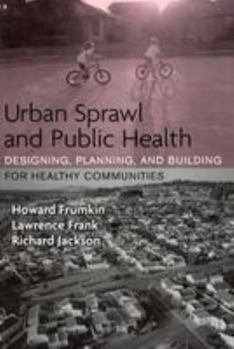Urban Sprawl and Public Health: Designing, Planning, and Building for Healthy Communities
Select Format
Select Condition 
Book Overview
In Urban Sprawl and Public Health, Howard Frumkin, Lawrence Frank, and Richard Jackson, three of the nation's leading public health and urban planning experts explore an intriguing question: How does the physical environment in which we live affect our health? For decades, growth and development in our communities has been of the low-density, automobile-dependent type known as sprawl. The authors examine the direct and indirect impacts of...
Format:Paperback
Language:English
ISBN:1559633050
ISBN13:9781559633055
Release Date:July 2004
Publisher:Island Press
Length:338 Pages
Weight:1.10 lbs.
Dimensions:0.9" x 6.1" x 8.9"
Related Subjects
Administration & Medicine Economics Administration & Policy City Planning & Urban Development Education & Reference Health Policy Home Improvement & Design How-to & Home Improvements Medical Medical Books Political Science Politics & Government Politics & Social Sciences Public Health Public Policy Social Sciences Urban Planning & DevelopmentCustomer Reviews
5 ratings
Compelling book that challenges convention
Published by Thriftbooks.com User , 14 years ago
The authors have brought together several disciplines in a compelling and convincing narrative that links the importance of urban planning for healthy living. The book contains striking data, stories and photos that show how closely the rise in obesity, diabetes and asthma (to name a few) have been linked to increasing urban sprawl. One of the main results of urban sprawl is increased time spent driving which not only increases stress but the time spent in gridlock traffic reduces family time and community involvement. The result of spending so much time commuting is much more severe than many people realize because it results in exhausted, anxious and stressed people who have little time to their children and neighbors, or in the language of the book "social capital." I highly recommend this book for anyone who seeks to see healthier cities that are designed for people rather than cars.
An excellent review of the science linking sprawl & public health
Published by Thriftbooks.com User , 16 years ago
This book provides an excellent overview of the science linking sprawl and public health that will be useful to both public health professionals less familiar with planning and planners less familiar with public health. Dr. Frumkin's message is clear: urban sprawl is having a detrimental impact on many aspects of public health. However, his tone remains objective and hence more useful. Moreover, the references alone make the book a very valuable text for all professionals working in this area.
Public Health input essential for Urban Planning
Published by Thriftbooks.com User , 16 years ago
The Europeans are way ahead of our efforts to consider health issues in the urban planning process. This book provides a history and direction to address urban sprawl and understand well the health implications of reckless or solely market-driven city planning. After all, no built community will have sustainability, if its populations are at risk for chronic and acute illness. Presented are the ingredients to make our cities safer and livable. This is a must read for City Planners, County officials, and anyone interested in cleaning up our urban communities with an eye toward social equity and environmental justice. MJY
The dis ease of living in the US
Published by Thriftbooks.com User , 18 years ago
The costs of sprawl are enormous. This book describes the costs in terms of many different types of public health measurements. If you haven 't thought about sprawl, this is a good place to start. It is chilling to think about how many physical, emotional, psychological and medical ramifications there are to the US automobile lifestyle. The price to degradation of the planet was not discussed in depth but that too would make you think about our legacy of our lifestyle to the quality of our planet for future generations. I am encouraged that the topic is being developed. The automobile lifestyle is addictive and to change it will require a paradigm shift. The shift starts with organized discussions and lucidly presented data. This book is excellent on both accounts.
reasonably well done
Published by Thriftbooks.com User , 19 years ago
A broad (though not particularly deep) guide to the public health problems associated with sprawl, including: (1) the air pollution caused by sprawl-induced auto traffic, (2) the health consequences of the reduction in walking caused by automobile dependency, (3) injuries and deaths from auto traffic, (4) water quality problems associated with suburban development, (5) the alleged intangible costs of automobile dependency (e.g. driving-induced stress, the isolation of nondrivers). None of these issues are addressed in enormous detail; for example, the book occasionally mentions pro-sprawl counterarguments, but does not fully address them. But then again, each of these topics could probably justify a separate book.




